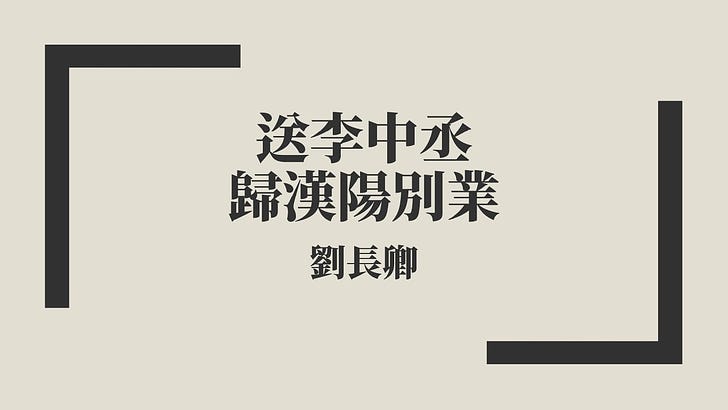Liu Changqing mourns the fate of a general
To Deputy Censor Li on His Return to His Hanyang Residence Liu Changqing Cast off, this hero of the southern wars, Who led millions, not so long ago. They’ve sent you home; with no occupation waiting any more, You’ll age and brood on golden years in the golden retinue. You single-handed quieted three theatres of war, How many times you risked life and limb, only that one sword can know. Above the rivers, round the city, darkness falls. When the sun sets, where then will you go? 刘常卿 送李中丞归汉阳别业 流落征南将,曾驱十万师。 罢归无旧业,老去恋明时。 独立三边静,轻生一剑知。 茫茫江汉上,日暮复何之。
Deputy Censor Li is not known outside this poem. I’ve been talking to my kids about this: they’re both more sciencey than arts oriented, and I’ve been trying to help them see how the arts, detached from the real world as they are, still so often define how the real world is seen. How many people do we know only from stories and poems? What great martial deeds must this Li have done in those wars in the south? But the thing that has us speaking his name, 1300 years later, is a poem.
We’re in the 770s, I think. Deputy Censor was a fairly senior position, one of two deputies to the Censor, who was answerable only the emperor. During the Tang, it was often something of an honourary title, not necessarily involving too much work, but recognition for those who have excelled elsewhere. Anyway, Li has sinned against the machine, and he has been dismissed, out of Chang’an, back to Hanyang, down in the south. He’s old. He’ll never return.
An obvious companion piece would be Wang Wei’s Ballad of the Old General, but where Wang invented a fictional composite, Liu is speaking directly to a real person. Perhaps this is part of the trend through the Tang Dynasty for taking poetry out of the realm of the formal and fictional and into the world of concrete, personal reality.
Notes
Hanyang: Built where the River Han meets the Yangtze.
Golden years in the golden retinue: In the Chinese, this is a single phrase, literally, “the bright times”. It meant the same as our golden years, and was also used to refer to the Tang Dynasty itself, hence the unpacking into two phrases in English.
Three theatres of war: Means all of the empire’s borders. During the Han Dynasty, there were three commanderies (provinces) where most of the border fighting happened, so those three theatres became a byword for the troubled border in general.
Rivers: River Han, Yangtze River.
Here’s Cinix with the reading:
Just listen to how every line ends on a down-tone. It adds to the downbeat feel of the work.
(*This is speculative! We must always be very careful about these comments on the sound of the poem, because reconstructions are only tentative, and we don’t know for sure how the poem sounded back then; nor how down-tones felt to contemporary listeners, on a psychological level. But that’s how it feels to me!)


